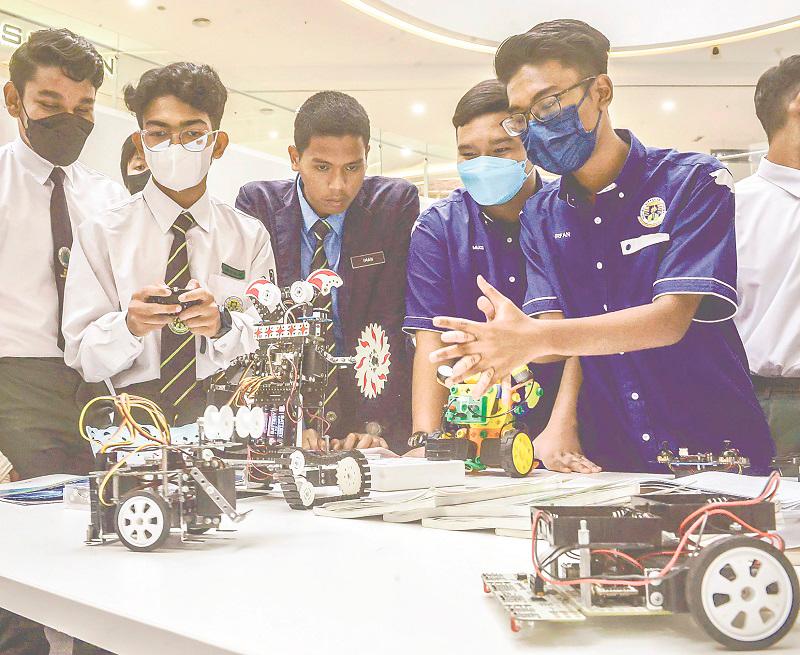AS artificial intelligence (AI) transforms global industries, redefining productivity, innovation and even geopolitics, one question looms large: Will Malaysia ride the wave or be swept aside?
Malaysia has made undeniable strides in AI. The recent establishment of a national AI office marks a critical step in consolidating efforts across the government, academia and industry.
Backed by partnerships with global tech giants like Microsoft, Google and Amazon, the country is building a formidable infrastructure to support its AI ambitions. The groundwork is being laid – but is it enough?
The answer hinges on one thing: talent.
Talent pipeline still under pressure
STEM (science, technology, engineering and mathematics) education is slowly improving. In 2024, Malaysia’s STEM enrolment hit 50.83%, up from 41.84% in 2019.
It is progress but not a breakthrough. The reality? Many of our brightest students are opting out of STEM fields due to outdated teaching methods, limited industry exposure and a lingering belief that these subjects are “too hard” or “too risky”.
Meanwhile, the demand for AI-related roles is exploding – with 500,000 AI-based jobs projected in Malaysia over the next six years.
At our current pace, we are not just behind the curve – we are facing a severe talent drought. This is not just an education issue – it is a national competitiveness crisis.
What if we treated AI talent development the way we treat national security? Because that is what it is. The next generation of geopolitical influence will not be won with weapons – it will be won with algorithms, data and talent.
Chasing trends or leading them?
In the global AI race, the temptation is to play catch-up. To copy what others are doing. However, that is not leadership – it is survival.
Malaysia should not aspire to be the Silicon Valley of Southeast Asia. It should aim to be something else entirely: a nation that builds ethical, inclusive and human-centric AI systems that serve industries and society.
The focus on ethical AI frameworks, currently being spearheaded by Science, Technology and Innovation Ministry, is a powerful differentiator.
As the world grapples with deepfakes, surveillance capitalism and algorithmic bias, Malaysia has a rare opportunity: to be the moral compass of AI in the global south, but that window is closing fast.
Why not lead in Islamic AI governance or in AI for climate resilience, tailored to Southeast Asia’s unique vulnerabilities or in multilingual AI, trained on Bahasa Malaysia and other regional languages? The tools are there. What we need is the ambition to think differently.
From assembly to intelligence lines
For decades, Malaysia thrived as a low-cost manufacturing hub but the game has changed. Global supply chains are moving upstream.
If we do not evolve beyond assembly, we risk becoming irrelevant.
Industry4WRD, Malaysia’s blueprint for smart manufacturing, has set a goal to raise productivity by 30% and increase the share of highly skilled workers in manufacturing from 18% to 35% by 2025. But it is more than a policy – it is a mindset shift.
Imagine Malaysian factories that self-diagnose their own malfunctions, predict supply chain disruptions and adapt in real time. Imagine small and medium enterprises using AI to design smarter products, not just produce them – this is upstream value and where the future is.
However, transformation will not happen with tax incentives alone. We need radical partnerships between industry and academia, on-site AI labs in factories and a national AI sandbox that allows local firms to test, fail, learn and win.
Asean 2025: Our moment to lead
Malaysia has now assumed the Asean chairmanship for 2025. This is no longer a theoretical opportunity – it is a live geopolitical platform. And in a year where AI will define
not just economies but alliances, Malaysia must act boldly.
Why not launch an Asean AI and cloud computing hub, anchored in Malaysia and powered by regional talent or initiate an Asean charter on AI ethics, grounded in Southeast Asian values of balance, community and consent? Why not push for an Asean startup passport, streamlining cross-border growth for AI entrepreneurs and tech innovators?
The US and China are locked in an AI arms race. Europe is busy regulating.
What about Asean? It can become the bridge – a middle path that blends cutting-edge innovation with ethical pluralism and cultural diversity. Malaysia, now holding the gavel, has the rare opportunity to script that story. However, this window will not stay
open for long. If we do not define the regional AI agenda now, someone else will – on their terms, not ours.
The clock is ticking
AI is not just a tool – it is a tectonic force. It will redefine how we work, learn, govern and live. The only question is whether Malaysia wants to shape that future or be shaped by it.
We are at a tipping point. The infrastructure is forming. The talent is emerging. The global stage is within reach. What remains is the political will – and the collective imagination – to turn potential into leadership. Because in the age of AI, playing it safe is the most dangerous move of all.
Tan Wei Siang is an alumnus of Digital Parliament Malaysia (P050-Jelutong) and Youth Parliament (P122-Seputeh), former secretary of MPKK Taman Free School and alumnus of the Penang Youth Assembly. Comments: letters@thesundaily.com









